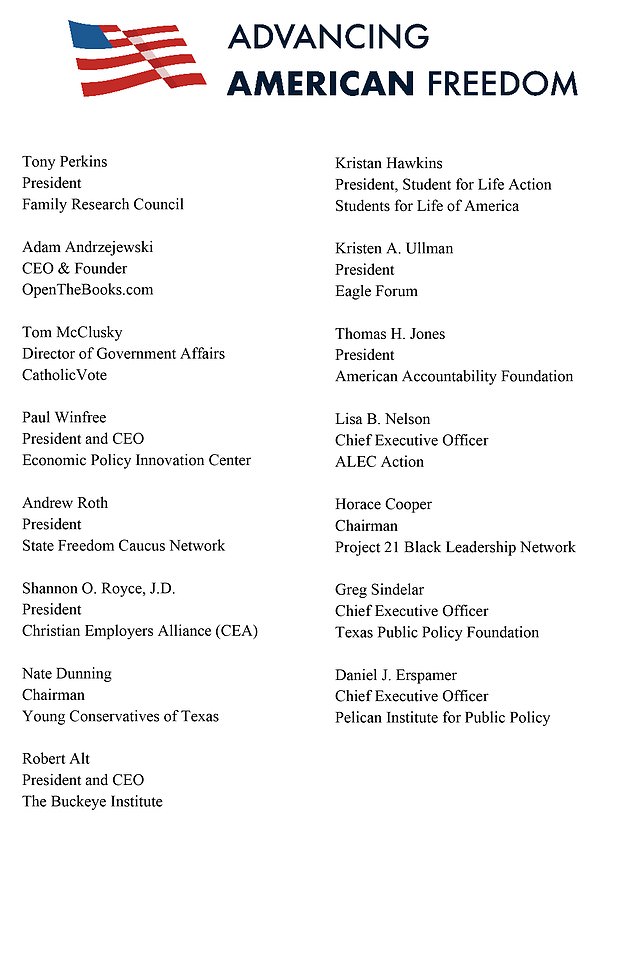Conservatives demand crackdown after 8,000 pet projects in Congress will cost taxpayers $15 billion by 2024: Republicans push to ban earmarks that include money for salmon research, shark studies and LGBTQ groups
A coalition of conservative groups led by former Vice President Mike Pence’s Advancing American Freedom wrote a letter this week calling on Republicans in Congress to ban earmarks again.
A pair of spending bills funding twelve government agencies for fiscal year 2024 include approximately 8,099 earmarks with a total cost of $14.6 billion.
‘This should never have happened. However, the solution is simple and the same as always: ban earmarks,” said the letter, obtained by DailyMail.com.
It was signed by leaders of 17 advocacy groups, including Heritage Action, Family Research Council and the State Freedom Caucus Network.
“Washington is using earmarks to fuel runaway spending,” Paul Teller, executive director of Advancing American Freedom, told DailyMail.com.
Sentiment in Washington about earmarks has changed over the years. Providing funding to members of Congress’ pet projects in their districts was banned for a decade. At one point, President Obama threatened to veto any bill that contained earmarks.

The practice of making federal money available for specific state and local projects began in the 1980s and increased until they were codified in 2007.
Around that time, concerns grew about corruption that peaked with the Alaskan “Bridge to Nowhere” – where Representative Don Young and Senator Ted Stevens led the funding of $223 million in taxpayer money to build a bridge between a small town in Alaska and an island with a population of 50 that housed an airport.
In a 2005 incident, Rep. Randy “Duke” Cunningham (R-Calif.) resigned from Congress and admitted that he had accepted $2.4 million in bribes from military contractors for awarding earmarks to them. Other lawmakers were found to have received campaign contributions in exchange for submitting earmark requests.
In response to the outcry, Congress imposed a 10-year moratorium on earmarks in 2011.
Earmarks returned in 2021 when both parties mutually agreed to allow the practice again.
They were rebranded as “community finance projects” and new guardrails were designed to eliminate ethical conflicts.
The difference between earmarks and the regular appropriations process is that they generally target projects that serve only a local or special interest, rather than a fixed amount of money given to an agency to distribute through its own review process.
Without earmarks, members of Congress could encourage groups to submit grant applications to relevant agencies or advocate for funding before a committee.

Sugarcane research in Louisiana raised $1 million in the most recent spending package

The Waadookodaading Ojibew Language Institute in Wisconsin is getting $5 million thanks to Democratic Senator Tammy Baldwin
Democrats were the first to embrace earmarks, and Republicans were initially more reluctant, with only about half of them requesting earmarks in 2022. all for his own district.
After the Republican Party won the majority in 2023, they further embraced earmarks, and this budget year about two-thirds of the Republican Conference will receive funding for district projects.
Some examples of pet projects in this year’s funding bills include:
The Waadookodaading Ojibew Language Institute in Wisconsin will receive $5 million thanks to Democratic Senator Tammy Baldwin.
New York Democrat Jamaal Bowman has raised $1.65 million to build an “artist living and working space” with the Environmental Leaders of Color.
Republican Representative Garrett Graves of Louisiana and Senator Bill Cassidy received $1 million for sugar cane research in their state.
Another $1 million will go toward Chicago’s electric vehicle infrastructure master plan, thanks to Sen. Dick Durbin, D-Ill.
In Providence, Rhode Island, $1 million will go toward a “citywide climate assessment.”
Rep. Greg Steube, a Republican from Florida, will get $190,000 for a “shark repellent study” in Sarasota.
Juvenile Pacific Salmon Research in Alaska gets $4 million thanks to Sen. Lisa Murkowsi, R-Alaska.
A 50-acre business development site in Lexington, Kentucky, known as Legacy Business Park, is getting $10 million thanks to Rep. Andy Barr, R-KY.
Public housing residents in Democratic Rep.’s California district. Nanette Barragan gets $1 million for a share of an electric car thanks to her.
Alabama State Route 167 gets $20 million thanks to GOP Sen. Katie Britt.
The NAACP headquarters in Baltimore is getting $500,000 thanks to Sen. Chris Van Hollen, D-Md.
A Boy Scout camp, Camp Maluhia, will receive $1 million for a new dining hall thanks to Senator Brian Schatz.
